2026 Author: Priscilla Miln | miln@babymagazinclub.com. Last modified: 2025-01-22 17:55:19
Labeo bicolor (bicolor) is a popular aquarium fish. It belongs to the large carp family. An unusual body shape that is a bit like a shark, a coloration that cannot be confused with any other, interesting behavior - all this turned the Labeo into a welcome inhabitant of aquariums.

Habitat
Labeo bicolor, whose photo you can see in the review, comes from Thailand. It was discovered in 1936 in the Chao Phraya River basin. The fish was so liked by local residents and aquarium dealers that after thirty years of its uncontrolled catch, as well as environmental pollution of the area, it was classified as an extinct species. Luckily, another small population was found in Thailand and the species has been moved to the endangered category.

Labeo bicolor is an aquarium fish that in natural conditions prefers to settle in streams and rivers, and in the rainy season migrates to flooded forests and fields. Scientists believe that it was the restriction of migration due to environmental problems that brought this species to the brink of extinction. Despite these sad facts, the labeo bicolor is widespread in captivity, it is activelybred by aquarists around the world.
External Features
If beginners who are interested in observing the underwater world are interested in the secret of the popularity of this fish, then for those who at least once kept a labeo, the answer is obvious. We will try and tell you more about it.
Labeo bicolor has a very bright and memorable appearance. He has a smooth, or rather, velvety black body with a luxurious bright red tail. The shape of this fish resembles a shark, not for nothing that the British called it the red-tailed shark (red tail shark). Such a spectacular combination of colors, great activity cannot go unnoticed even in a densely populated aquarium.
In nature, there is an albino labeo that is devoid of pigment and has a white body, red eyes and fins. Such a fish differs from its two-color counterpart only in color.

Labeo is a rather large fish, which on average reaches a length of 15 cm, but there are individuals of 18 cm each. The bicolor labeo lives for about 6 years, although there have been cases of longevity - up to 10 years.

Gender differences
Labeo bicolor is an aquarium fish (we posted a photo in this article), the gender differences of which are almost invisible to beginners. Sexually mature females have a more rounded and full abdomen. Perhaps this is where all the differences end.
Aquarium keeping
We have already said that the labeo bicolor is a rather large fish, and besides, it is territorial, so for itContents need a voluminous and spacious aquarium with a volume of at least 200 liters. You should know that the less free space and the more neighbors the labeo has, the more aggressive they become.

The aquarium must be covered, because these fish are excellent jumpers, and therefore they can die if they make an unsuccessful jump once. The content of the labeo is simple, for him the most important thing is space and as many plants as possible, which serve as additional food for him. When fully nourished, it does not damage plants, only in case of hunger.
Water requirements
These fish feel most comfortable in peaty water. To get it, just put a bag of peat next to the filter or directly into it. It needs to be changed every three weeks. The aquarium should have powerful filtration and aeration, partial water changes (up to 20%) weekly.

Labeo, like other river inhabitants, loves clean and fresh water. Optimal parameters for her:
- temperature +26 °C;
- water hardness medium;
- PH - 6.8-7.5.
Lighting
Labeo needs moderate lighting, so plants for the aquarium, which sometimes serve as food, are best grown in another, brightly lit aquarium. There is another option - powerfully illuminate the aquarium, which will allow algae to actively develop, and shade the bottom with the help of large-leaved plants and grottoes.

Feeding
Under natural conditions, the two-colored labeo feeds mainly on plant foods, but does not refuse larvae, worms, and various insects. In the aquarium, these fish prefer foods containing plant fiber - granules, tablets, flakes. Now these types of food are presented in pet stores in a wide range, so aquarists do not experience any problems in this regard.
You can diversify the diet of your pets with slices of cucumbers, zucchini, lettuce leaves. Labeo is happy to eat animal feed, and any. Nevertheless, the basis of his diet should be plant foods.

Labeo bicolor: reproduction
We want to warn inexperienced aquarists right away: breeding these fish is quite difficult. Most often, this variety is bred on farms in Southeast Asia or domestic professionals do this. The thing is that gonadotropic hormones are used for spawning in captivity. The slightest mistake in the dosage of these drugs leads to the death of the fish.

There are several schemes to stimulate spawning. Let's introduce you to two of them. For the first injection, chorionic gonadotropin is used. Sometimes it is replaced with the drug "Pregnil". Females are injected at the rate of 5-10 IU per 1 g of fish weight, a day later a suspension of the dehydrated pituitary gland of cyprinids is injected - it is done for both males and females at 0.2 and 0.1 mg, respectively, per 10 g of weight.
The injection must be done in the musclesback, between scales, slightly above lateral line. Immediately after spawning, producers add an antibiotic to the water, which will protect against the development of infections, since the pituitary gland suspension is a non-sterile preparation. It is difficult to buy it, in the free sale of this tool does not happen. It can only be purchased at specialized farms.
You can use non-hormonal drugs, for example "Nerestin". It is used in the form of injections or fed to fish with live food. This must be done twice with an interval of a day. In this case, as a rule, the spawning state occurs much later.
Male shortage
Reproduction of labeo bicolor can be difficult due to too few males in litters. To get the right amount of them, fish must be grown in large volumes. Also, because females are heavier and fuller than males, in the battle for territory, the latter usually suffer a crushing defeat, and not all of them survive.
If you have set yourself the goal of raising young animals - plant teenagers from the general tank into a separate and calmer aquarium. When they grow up, they may be such scarce males.
Water for spawning should be fresh, settled, slightly peaty. The temperature is not lower than +27 ° C (after injections, a lower temperature is contraindicated for fish!), It is desirable to reduce the stiffness. The aquarium should be equipped with good aeration and be sure to have a pump that creates a strong flow of water.
Labeo are pelagophiles. In other words, the caviar of this species must by all means flow of waterrise from the bottom. It ripens in suspension.
Spawning
Before spawning, females and males are settled for one to two weeks in different aquariums. During this period, they need enhanced nutrition and frequent water changes. After injections, they are transferred to a spawning tank - two or three males per female. The spawning tank must be oval or round in shape, with a volume of at least one hundred and fifty liters and a height of fifty centimeters.
Labeo bicolor: compatibility with other fish
Often, the two-color labeo is positioned by sellers as a fish that is suitable for a general aquarium. In fact, this assertion is wrong. This does not mean that he should be kept alone, but that he needs special neighbors, all owners should know.
While the fish is small, it avoids conflicts, but sexually mature individuals become aggressive. This is especially felt by individuals similar in color and size. What fish should be avoided as labeo neighbors? First of all, do not try to house a pair of this species together, even if there is enough space for them. When they meet, they will definitely put up fights.

You can not hook them with fish that are similar in body shape or color. They manage to attack even sword-bearers. Bottom-dwelling fish will also suffer, as the labeo feeds in the bottom layers. More or less, the Ancistrus "gets along" with these bullies thanks to their hard armor.
So who will get along with labeo bicolor? Nearly perfect compatibilitycharacins and cyprinids, fast and medium-sized fish. For example, mossy and Sumatran thorns, barbs, zebrafish, fire barb, Malabar zebrafish. These fish are very fast, and the labeo simply cannot catch up with them, and they live mainly in the middle and upper layers. The character of the labeo only deteriorates with age, so the selection of neighbors for him must be approached very carefully.
Recommended:
Compatibility of males with other fish in the aquarium
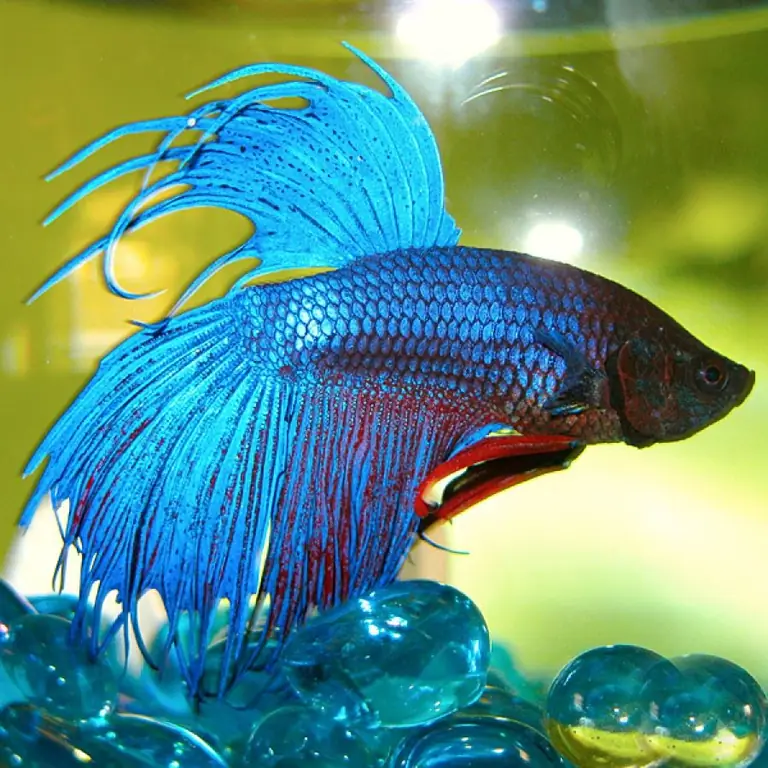
Petushki are beautiful and very interesting aquarium fish. However, their content is associated with certain difficulties due to their fighting nature. How to avoid unnecessary problems and provide all the inhabitants of the aquarium with a calm and happy life?
Macropod (fish): compatibility with other fish in the aquarium
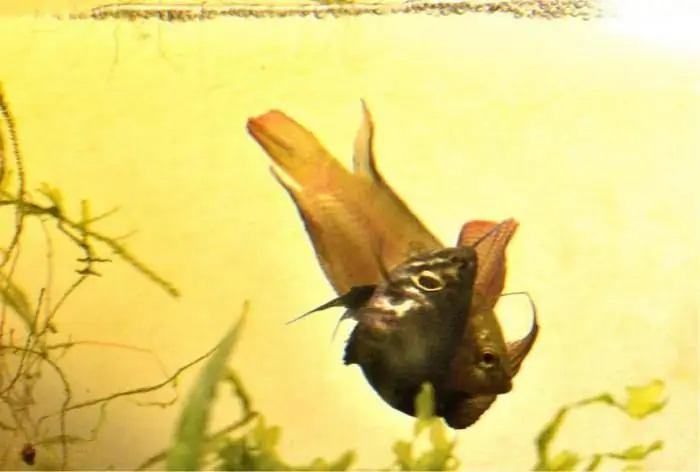
Macropod is a fish that is a longtime friend of aquarists, both experienced and beginners. This paradise fish - another name for the macropod - along with the goldfish were the first inhabitants of European aquariums. These beauties are unpretentious to living conditions, but have some features of care and reproduction
Black scalar: description, content, compatibility with other fish
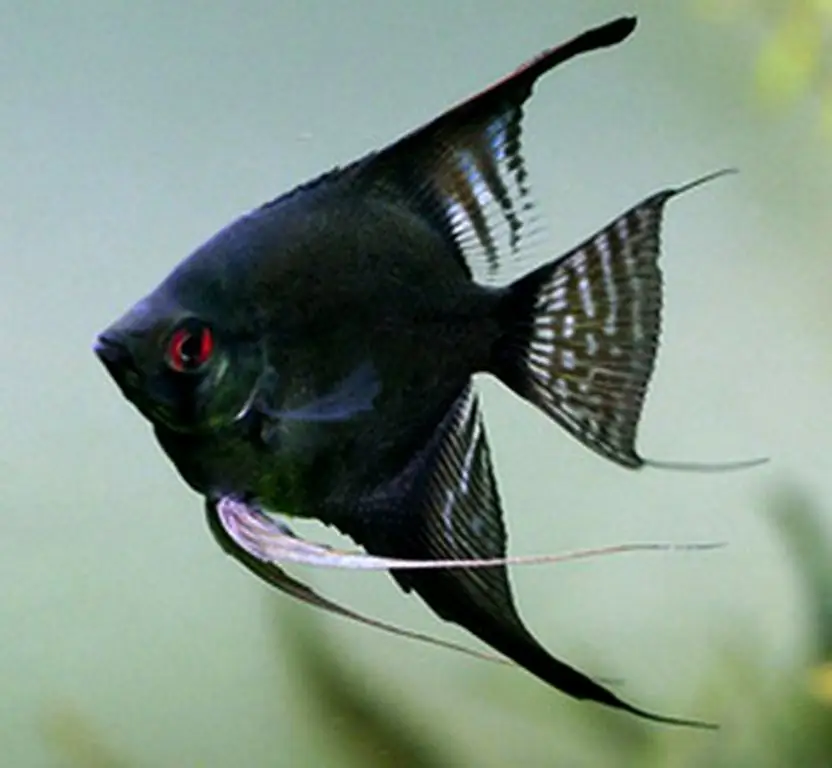
A beautiful, fairly large fish can attract the attention of even a person who is not interested in aquariums. The velvet color contrasts amazingly against the background of calm algae or the bottom of the aquarium. It is these characteristics that can be given to the scalar
Aquarium cockerel fish - maintenance, care and compatibility with other fish
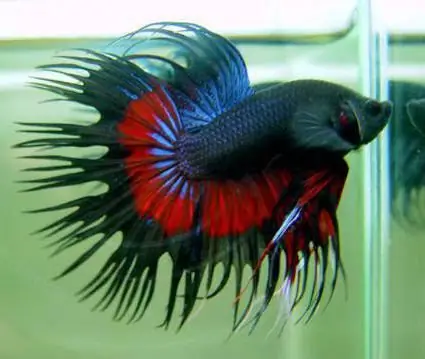
Cockerel fish, or, as it is also called, fighting fish, is a representative of the labyrinth family. Such a name for this species is not accidental. The bright color, as well as the warlike character of the "fighters" in some way resembles the same cocky and beautiful "earthly" roosters
Acara turquoise: photo, content, compatibility with other fish in the aquarium
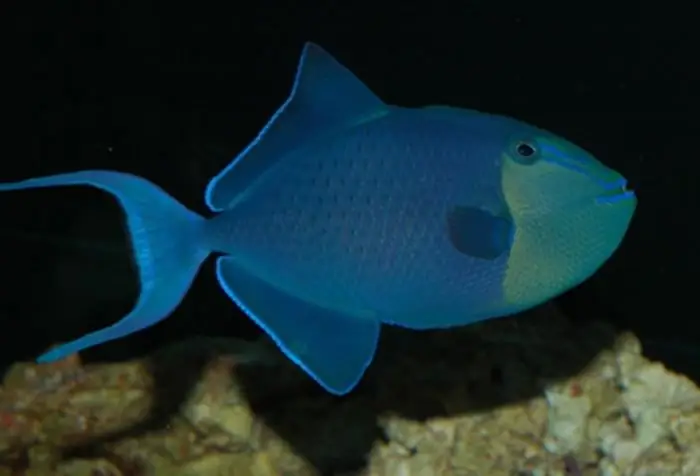
Turquoise akara is famous not only for its magnificent view. In the West, it is often called "green horror". This is due to its aggressiveness towards other inhabitants of the aquarium. But this does not mean that the fish should live alone. The task of the owner is to create optimal conditions for individuals of this species, to add suitable fish to them. Then there won't be any problem

